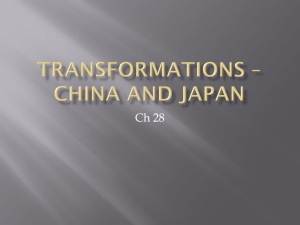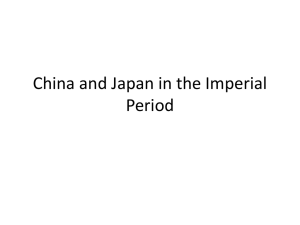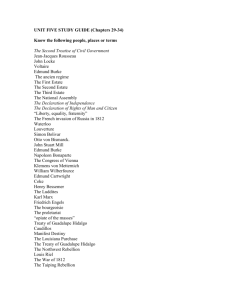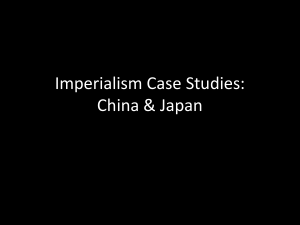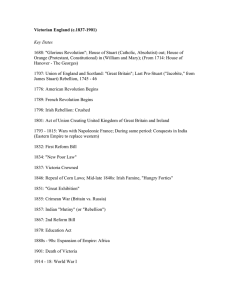Imperialism- Southeast Asia
advertisement
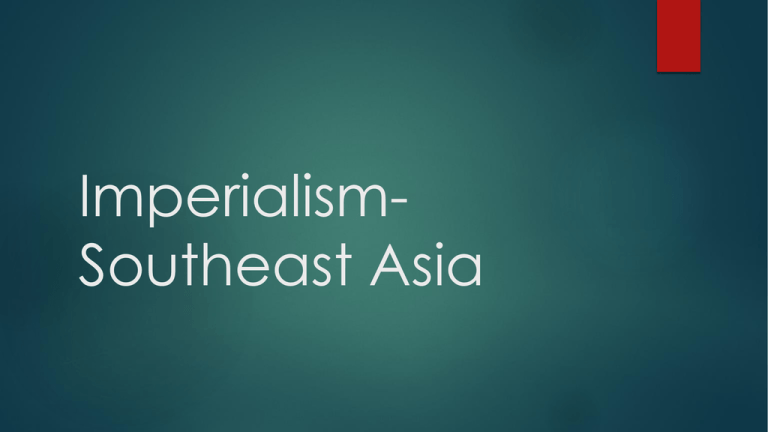
ImperialismSoutheast Asia Have you ever seen something you wanted and did absolutely anything in order to get it? Describe different examples! How is this similar to imperialism? What’s next? Recap: 1. Rushed to divide Africa 2. Next, carve up SE Asia 3. Pacific Rim: border Pacific Ocean 4. a) Strategic Location b) Tropical Agriculture c) Minerals d) Oils Everyone wants a piece of the action! Dutch get there first Seized Malacca Fought British/Java for Java Rule whole island chain of Indonesia Dutch East Indies Plantations/Trade Many move there Think of Tourists? Why? Social Class Dutch on top Indonesians next Plantation workers Britain Gain Singapore, Malaysia Sheltered harbor Why do they want this harbor? Location, Location, Location India-China sea routes Malaysia Becomes leading Rubber importer Who is going to make products? Chinese migrate there, Malaysia Become minority. French French Indochina Vietnam, Laos, Cambodia, and N. Vietnam Most of land=rice production More exportation then import Vietnamese resistance Impact on All Economies grew Roads, harbors, rail systems. How do these help? Education, health, sanitation down Different Religions (Why would this cause a problem)? Siam: Independent Lay between Burma (Britain) and Indochina (French) Is this good or bad? Siamese kings promote neutrality King Mongkut Progress Schools started Reform legal system Railroads/telegraph systems End to slavery Why does Siam not want to be imperialized? What are some good and bad things about being imperialized? United States/Philippines US acquire through Spanish-American War: Philippines, Puerto Rico, and Guam Philippines: Not ok with imperializing Philippine Nationalist: Claim US promised Independence Philippine Republic Fierce struggle Defeat Philippines in 1902 Prepare them to self-rule Roads, railroads, school systems China Recap: 1793: Englishmen brings gifts to Qing Dynasty. Not impressed, state they have everything they need (Isolationism) Economy Grew (Rice and products from Americas) Mining and Manufacturing Many Jobs Tea Opium Connection Think to yourself, what makes you want to buy a product? Product Europe made that China wanted Opium: Narcotic product from poppy plant 12 million eventually become addicted Much medical harm came from it Britain does not stop trading illegally Opium War: mostly at sea British navy great, China’s ships outdated Treaty of Nanjing: Hong Kong given to Britain Extraterritorial rights: not subject to Chinese law if Britain controlled territories. Taiping Rebellion Taiping: “Great Peace” Share China’s vast wealth No poverty 1 million peasants join SE Asia take over Taiping govt constantly feuding British and French help China Taiping government brought down 20 million died from rebellion Why is this a good time to attack China? Other countries attack China while weak Treaties give Spheres of Influence: Have a say in Trade and investment. United States worried they will be shut out Open Door Policy: China’s doors be open to all nations. Boxer Rebellion Poor Peasants resent special privileges granted to foreigners Resent Chinese Christians: Foreign Faith Boxer Rebellion: Secret Society “The Boxers” Take down government and Foreign influence Take Beijing Awaited an alliance (no show) 19,000 troops march to Beijing Boxers lose Nationalism-heavy Talk of a new form of government Japan Up until now: No contact with industrialized world. Only traded with China and Dutch (Trade grew important) Matthew Perry (America): 4 steamed ships with cannons to Japan Japan impressed and was convinced they needed to trade President Fillmore writes polite note about trade Treaty of Kanagawa: Japan opens two ports for trade to US Other Western powers follow Opened the door to others Reform and Modernization Why would the Japanese be mad about trading with others? Mutsuhito: Takes power (Military dictatorship before him) Meiji: Enlightened rule Best way to counter West influence is to modernize Germany: Centralized govt. (Japan makes their own) German Army/British Navy American: Public Education Industrialization Begins Railroad Coal Lines Production Factories (Tea and Silk) Imperialize Warships built, army raised (500,000)=strongest military power in Asia. Mission: Eliminate Extra-territorial rights of foreigners Extra-territorial rights eliminated Japan and China interested in Korea Hands-On Agreement: Neither would send Armies into Korea China breaks agreement Sino-Japanese War Japan drives China out Treaty signed Japan gets Taiwan and Pescadores Islands Russo-Japanese War Russia and Japan: 2 powerhouses and enemies Japan offers Russian rights in Manchuria if they do not go into Korea Russia refuses, war breaks out Japan destroys Russia Treaty of Portsmouth: Gave every conquered territory In that war Occupation of Korea China out, Russia out, now Japan attacks Korea Annexation of Korea, (Japan control) Education: Korean language to Japanese Farm land given to Japanese Japan businessmen start Korean Nationalism Whole world saw brutality of Japan They ignore it Why?
